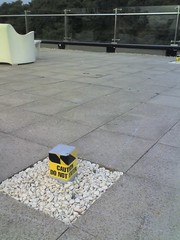 In those days (early 80s) the Zap Club was a venue for 'comedy, cabaret, poetry, film, installation, dancing, theatre, music, street art, pantomime, alternative circus' with much audience involvement, often cross-programming these genres - so an audience might experience a juggler, a comedian, a performance artist and a band all in one night. After a period based in various venues, two arches beneath the seafront road and right on the beach were converted to be a permanent home.
In those days (early 80s) the Zap Club was a venue for 'comedy, cabaret, poetry, film, installation, dancing, theatre, music, street art, pantomime, alternative circus' with much audience involvement, often cross-programming these genres - so an audience might experience a juggler, a comedian, a performance artist and a band all in one night. After a period based in various venues, two arches beneath the seafront road and right on the beach were converted to be a permanent home. 
My Zap career began simply enough. I was watching a boxing match in my girlfriend's flat when Neil Butler, one of the Zap directors, ran to ask if I'd like to do some cleaning at the newly-opened club - he had seen a performance piece I'd done on a cleaning theme and thought the work would appeal to me. (This was very much the modus operandi of the organisation - getting mates and artists to do things rather than professionals. Recruiting an unemployed graduate who had once done a performance about cleaning, rather than, say, an actual cleaner, was one of the more normal business decisions.)
Aside: My cleaning performance was inspired by part-time office cleaning jobs I had whilst at college. The process appealed to me on many levels. Being in buildings after hours, not part of the real purpose of the place but a sort of nightside crew; the repetitive ritualistic actions; the occasional moments of surrealism, such as entering a floor that had until the previous night been full of desks, filing cabinets, shelves and the traces of people's lives (kids photos on partitions and comedy coffee cups) and finding it completely empty apart from 10 telephones on the carpet - the reality seemed like performance art, so turning it back into an artwork was tempting. I recall mixing a bucket of Alka Seltzer and drinking it, most of it going on the floor where various electrical items were lying; setting fire to a Christmas angel by fire-eating with methylated spirits; rainbow arcs of cleaning materials everywhere. No Health & Safety Risk Assessments in those days - just good honest entertainment.
I was the cleaner there for two years, my first full-time job. I also did maintenance, bar work, compering, performance, and publicity - the latter a mostly voluntary add-on which I have somehow parlayed into a career in marketing.
The cleaning part was occasionally challenging. Let me just say that I dealt with anything which might emerge from a human body, placed everywhere that such things don't belong. I must have swept up tons of broken glass and cigarette ash, leavened with the detritus of the Zap's peculiar programme: if the trash didn't include something like a sequinned jockstrap, 17 dead fish painted fluoresecent pink, and a broken euphonium, the previous night had probably been a private hire for an accountant's birthday party.
Amidst all of this I got to meet lots of great people, such as
It was an unforgettable time.
And yet I don't always put the Zap Club on my CV - sometimes that slot is filled with the blandly sinister 'Gresham Associates' (the off-the-shelf company name of the four directors who had invested to create the Club in its permament premises) coyly described as an 'arts organisation'. Somehow the Zap feels like a chink in my symbolic armour, like turning up for an interview in a standard suit and tie, but wearing mascara or riding a unicycle. My fear is that if I did list it, next to a string of local authorities and polytechnics, someday a Vice-Chancellor or somesuch would boomingly ask what this 'Zap Club' was all about. What would I describe? Hurling a burning sculpture into the sea, with artist Roland Miller and some men from an airgun club who had stopped in for a drink and become embroiled in a performace art spectacle? Attaching lychees to the outstretched fingers of a blindfolded audience member on one of Ian Smith's unwisely-named 'Abuse Nights' ('Hold out your fingers madam... here comes the eyeball')? Having a curiously normal conversation about Eastbourne with the (completely naked) Neo Naturists in the (ironically named that evening) dressing room? Or one of the weird nights?
And yet maybe I should mention it. Thinking about it now, that sprawling, UV-lit, Seven Hundred Drunken Nights period taught me a lot. From that crucible of hedonism, creativity, enterprise and fun I emerged with an unquenchable sense that the the show must and shall happen; even without boring things like budgets or plans, amazing unpredictable lovely things can be brought into being; take a bag of mad ideas and pursue them with utter conviction; even if you have no script for what you're going to say or do or why, you can walk on to the stage, do your three minutes,
provisionally
solve
the
equation
of
love.


